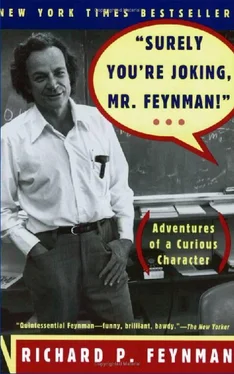“It was easy,” I said, “because I never let them tell me what the offer was.”
A week later I got a letter from her. I opened it, and the first sentence said, “The salary they were offering was—,” a tremendous amount of money, three or four times what I was making. Staggering! Her letter continued, “I told you the salary before you could read any further. Maybe now you want to reconsider, because they’ve told me the position is still open, and we’d very much like to have you.”
So I wrote them back a letter that said, “After reading the salary, I’ve decided that I must refuse. The reason I have to refuse a salary like that is I would be able to do what I’ve always wanted to do—get a wonderful mistress, put her up in an apartment, buy her nice things... With the salary you have offered, I could actually do that, and I know what would happen to me. I’d worry about her, what she’s doing; I’d get into arguments when I come home, and so on. All this bother would make me uncomfortable and unhappy. I wouldn’t be able to do physics well, and it would be a big mess! What I’ve always wanted to do would be bad for me, so I’ve decided that I can’t accept your offer.”
Part 5.
The World of One Physicist
Would You Solve the Dirac Equation?
Near the end of the year I was in Brazil I received a letter from Professor Wheeler which said that there was going to be an international meeting of theoretical physicists in Japan, and might I like to go? Japan had some famous physicists before the war—Professor Yukawa, with a Nobel prize, Tomonaga, and Nishina—but this was the first sign of Japan coming back to life after the war, and we all thought we ought to go and help them along.
Wheeler enclosed an army phrasebook and wrote that it would be nice if we would all learn a little Japanese. I found a Japanese woman in Brazil to help me with the pronunciation, I practiced lifting little pieces of paper with chopsticks, and I read a lot about Japan. At that time, Japan was very mysterious to me, and I thought it would be interesting to go to such a strange and wonderful country, so I worked very hard.
When we got there, we were met at the airport and taken to a hotel in Tokyo designed by Frank Lloyd Wright. It was an imitation of a European hotel, right down to the little guy dressed in an outfit like the Philip Morris guy. We weren’t in Japan; we might as well have been in Europe or America! The guy who showed us to our rooms stalled around, pulling the shades up and down, waiting for a tip. Everything was just like America.
Our hosts had everything organized. That first night we were served dinner up at the top of the hotel by a woman dressed Japanese, but the menus were in English. I had gone to a lot of trouble to learn a few phrases in Japanese, so near the end of the meal, I said to the waitress, “Kohi-o motte kite kudasai.” She bowed and walked away.
My friend Marshak did a double take: “What? What?”
“I talk Japanese,” I said.
“Oh, you faker! You’re always kidding around, Feynman.”
“What are you talkin’ about?” I said, in a serious tone.
“OK,” he said. “What did you ask?”
“I asked her to bring us coffee.”
Marshak didn’t believe me. “I’ll make a bet with you,” he said. “If she brings us coffee.”
The waitress appeared with our coffee, and Marshak lost his bet.
It turned out I was the only guy who had learned some Japanese—even Wheeler, who had told everybody they ought to learn Japanese, hadn’t learned any—and I couldn’t stand it any more. I had read about the Japanese-style hotels, which were supposed to be very different from the hotel we were staying in.
The next morning I called the Japanese guy who was organizing everything up to my room. “I would like to stay in a Japanese-style hotel.”
“I am afraid that it is impossible, Professor Feynman.”
I had read that the Japanese are very polite, but very obstinate: You have to keep working on them. So I decided to be as obstinate as they, and equally polite. It was a battle of minds: It took thirty minutes, back and forth.
“Why do you want to go to a Japanese-style hotel?”
“Because in this hotel, I don’t feel like I’m in Japan.”
“Japanese-style hotels are no good. You have to sleep on the floor.”
“That’s what I want; I want to see how it is.”
“And there are no chairs—you sit on the floor at the table.”
“It’s OK. That will be delightful. That’s what I’m looking for.”
Finally he owns up to what the situation is: “If you’re in another hotel, the bus will have to make an extra stop on its way to the meeting.”
“No, no!” I say. “In the morning, I’ll come to this hotel, and get on the bus here.”
“Well, then, OK. That’s fine.” That’s all there was to it—except it took half an hour to get to the real problem.
He’s walking over to the telephone to make a call to the other hotel when suddenly he stops; everything is blocked up again. It takes another fifteen minutes to discover that this time it’s the mail. If there are any messages from the meeting, they already have it arranged where to deliver them.
“It’s OK,” I say. “When I come in the morning to get the bus, I’ll look for any messages for me here at this hotel.”
“All right. That’s fine.” He gets on the telephone and at last we’re on our way to the Japanese-style hotel.
As soon as I got there, I knew it was worth it: It was so lovely! There was a place at the front where you take your shoes off, then a girl dressed in the traditional outfit—the obi—with sandals comes shuffling out, and takes your stuff; you follow her down a hallway which has mats on the floor, past sliding doors made of paper, and she’s going cht-cht-cht-cht with little steps. It was all very wonderful!
We went into my room and the guy who arranged everything got all the way down, prostrated, and touched his nose to the floor; she got down and touched her nose to the floor. I felt very awkward. Should I touch my nose to the floor, too?
They said greetings to each other, he accepted the room for me, and went out. It was a really wonderful room. There were all the regular, standard things that you know of now, but it was all new to me. There was a little alcove with a painting in it, a vase with pussywillows nicely arranged, a table along the floor with a cushion nearby, and at the end of the room were two sliding doors which opened onto a garden.
The lady who was supposed to take care of me was a middle-aged woman. She helped me undress and gave me a yukata, a simple blue and white robe, to wear at the hotel.
I pushed open the doors and admired the lovely garden, and sat down at the table to do a little work.
I wasn’t there more than fifteen or twenty minutes when something caught my eye. I looked up, out towards the garden, and I saw, sitting at the entrance to the door, draped in the corner, a very beautiful young Japanese woman, in a most lovely outfit.
I had read a lot about the customs of Japan, and I had an idea of why she was sent to my room. I thought, “This might be very interesting!”
She knew a little English. “Would you rike to see the garden?” she asked.
I put on the shoes that went with the yukata I was wearing, and we went out into the garden. She took my arm and showed me everything.
It turned out that because she knew a little English, the hotel manager thought I would like her to show me the garden—that’s all it was. I was a bit disappointed, of course, but this was a meeting of cultures, and I knew it was easy to get the wrong idea.
Читать дальше












